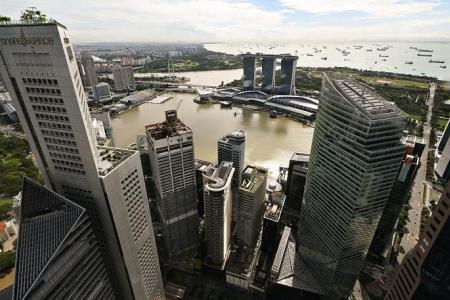Singapore Manufacturing Federation launches upskill guide, sustainability service for SMEs
Smaller firms here can now borrow an expert to help them decarbonise their business activities and meet reporting rules on sustainability issues.
The initiative will allow local manufacturers – mainly small and medium-sized enterprises (SMEs) – to comply with the disclosure rules their multinational partners need to make regarding the carbon emissions of their supply chains.
The Singapore Manufacturing Federation (SMF) unveiled the programme – known as the Chief Sustainability Officer (CSO) as a Service – on Jan 19 in a bid to boost the competitiveness and credibility of Singapore’s export-driven manufacturing sector, which contributes about 22 per cent of the nation’s gross domestic product.
“Companies need to start reporting emission numbers or risk losing out to competitors, as many of them are suppliers for international partners who will soon need to submit reports about the carbon footprint of their supply chain,” said SMF president Lennon Tan.
He added that the federation understands that many SMEs cannot afford dedicated staff to plan and oversee sustainability initiatives due to limited resources, and so are unsure about where to begin.
A firm can ask for an SMF in-house expert to work with their own CSO and help plan a decarbonisination pathway, and to gather data on environmental, social, and corporate governance issues and report it in accordance with local and international standards.
The SMF expert will not be full time at the SME but will spend enough time to show the staff what to do, and return to help when the firm has reached the next stage of its plan.
As the largest national organisation representing the interests of manufacturers, SMF is working closely with members to address challenges they face on their sustainability journey,” said Mr Tan, who was speaking at the SMF Manufacturing Day Summit 2024 held at the Sands Expo & Convention Centre in Singapore.
The SMF also unveiled a playbook to help manufacturers, especially SMEs, upskill their employees, particularly in the precision engineering sector, which employs over 90,000 people.
It noted that the playbook is the first such guide for a manufacturing sub-sector and will be one of many to cover other sub-sectors, with at least two being produced every year.
The playbook – compiled by the Advanced Manufacturing Training Academy (AMTA) and SkillsFuture Singapore (SSG) – aims to help firms cope with a tide of transformative challenges, including disruptive technologies, rising costs, intense competition, a shortage of skilled operators and the looming threat of supply chain disruptions amid geopolitical uncertainties.
Mr Alvin Tan, Minister of State of Trade and Industry and Culture, Community and Youth, told the summit that Singapore, as the world’s eighth largest exporter of high-tech goods, is a regional powerhouse for manufacturing.
But global shifts like the pace of technological advancements, reconfigurations in global supply chains and consumers’ scrutiny of sustainable practices amid growing environmental concerns point to a more uncertain future for manufacturing.
“In today’s age of intense competition, Singapore must continue to invest significantly in research, innovation and enterprise efforts,” Mr Tan added.
“There are new opportunities amidst these global shifts too, that will allow Singapore to maintain and even enhance our attractiveness as a manufacturing hub.”
However, to capture these opportunities, Singapore must double down on its key and core value propositions that include connectivity, stability and a well-developed innovation ecosystem.
“As the world grapples with the environmental and social consequences of traditional manufacturing, compounded by shifts in consumer preferences towards more sustainable products and offerings, the need for sustainable manufacturing practices has become increasingly urgent,” Mr Tan said.
He also stressed the importance of investing in the local workforce and urged companies to upskill and reskill their workers by tapping various schemes, such as the SkillsFuture Enterprise Credit.
AMTA director Zeng Xianting said the new playbook encompasses six key roles, ranging from operators to specialists and engineers, providing a detailed breakdown of essential role changes and the new skill proficiencies necessitated by disruptive technologies.
“It (the playbook) aims to empower the industry to maintain its competitive edge by providing a clear strategy for engineers, specialists, and operators to adopt new competencies,” Dr Zeng added.
Get The New Paper on your phone with the free TNP app. Download from the Apple App Store or Google Play Store now


